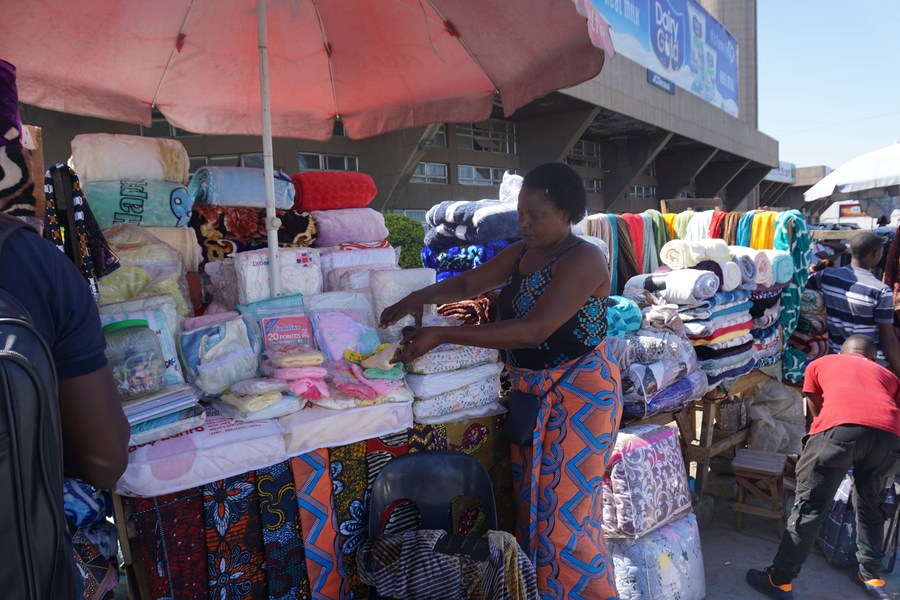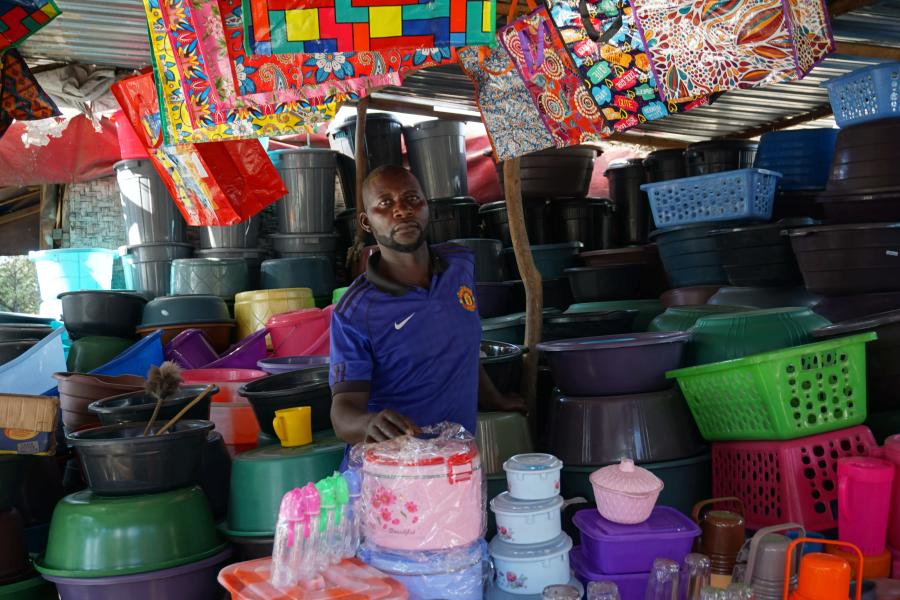
Rebecca Phiri, a trader dealing in baby wear and beddings, works at a market in Lusaka, Zambia, on April 5, 2021. (Xinhua/Lillian Banda)
In Zambia, a number of manufacturing companies are not only ensuring that small-scale traders stay in business but are to a greater extent also helping to address high unemployment levels in the country.
LUSAKA, April 14 (Xinhua) -- It is a known fact that the COVID-19 pandemic has injured many countries' industrial production capacity.
However, not all is gloomy, as the pandemic has equally compelled some progressive countries to be inward-looking, with regard to the provision of basic services to citizens within a specified national geographical situation.
To this end, some countries have been forced to industrialize, as the importation of raw materials and finished goods is now a nightmare owing to reduced global travel, and invariably domestic and commercial products have become scarce, or when available, clearly beyond the reach of ordinary citizens.
In Zambia, a number of manufacturing companies are already doing their best to keep afloat and meet the ever-growing demand for raw materials and finished goods that were sourced out of the country, prior to the advent of COVID-19.
The homegrown development efforts of these companies are not only ensuring that small-scale traders stay in business but are to a greater extent also helping to address high unemployment levels in the country.
Boyd Siame, who runs business in Mandevu Township's Lupili Market in Zambia's capital Lusaka, is happy to note that COVID-19 is a blessing in disguise to the local manufacturing industry now taking center stage in business
Siame, a household products dealer, said many small-scale traders in Zambia have survived harsh economic times because of local manufacturing companies that stepped up to the plate.
"My business has stayed afloat because local manufacturers stepped in to produce the goods I used to get from neighboring countries particularly Tanzania," he said.
He adds that it is encouraging that most local manufacturing companies are not just supplying the Zambian market but also the Common Market for Eastern and Southern Africa (COMESA), the Southern African Development Community (SADC), and the Great Lakes Region.
"I am aware of traders that come as far as Zimbabwe to get quality household goods manufactured in Zambia. That tells you that our local industry is capable of producing goods," said Siame.
For Rebecca Phiri, a trader dealing in baby wear and beddings at COMESA market in Lusaka, business remains good, as she is still able to get almost all her merchandise locally.

Boyd Siame, a household products dealer, works at a market in Mandevu Township, Lusaka, Zambia, on March 17, 2021. (Xinhua/Lillian Banda)
Phiri explains that the advent of the COVID-19 was to her an apparent misfortune that eventually has good results in that, like many other traders, at the market she no longer has to travel outside Zambia to get goods for resell as all her supplies are sourced locally.
"With travel restrictions, we had to rely on local manufacturers for most of the items and they have not disappointed. This has helped to cut down on travel costs as well as the time spent traveling either to source goods," attested Phiri.
She asserted that local industries had within a short period made tremendous improvements in terms of the quality of goods manufactured and produced within the geographical landscape.
"It is becoming increasingly difficult to tell which blankets for instance are made in South Africa and those made within Zambia on account of a noted improvement in quality," Phiri said.
Phiri, who prior to the COVID-19 era got her merchandise from Botswana and South Africa, further added that getting things locally has helped her to have more time for customers and pay attention to their needs as she is now often in her trading space.
And COMESA market trust chairperson Misheck Musonda commended local manufacturing companies for quickly responding to the needs of both resellers and consumers and ensuring that gaps in the supply chain are minimized.
But industrial economist Misheck Mwanza does not want manufacturers to sit on this performance laurel, preferring more investments into the manufacturing sector, as a means to overcome noted high unemployment, high-income inequality, and high poverty confronting a majority of Zambian citizens.
"I believe investment in the manufacturing sector has the potential to lift many out of abject poverty as more men, young people and women will be employed. Zambia must now begin to invest in the production of high-value goods," advised Mwanza. ■




